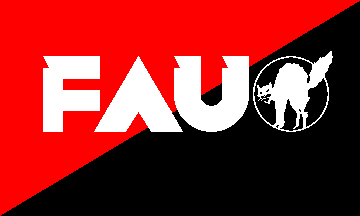During time spent in Berlin visiting friends and relatives, I decided to contact the Freie ArbeiterInnen Union (FAU) – the German section of the International Workers Association (IWA), of which I am a member of its British section; the Solidarity Federation.
I met in Kreuzberg, a well-established radical area in Berlin, with comrades who have founded the English speaking sub-group initiative within FAU Berlin. This is a group specifically designed to organise workers for whom German is not a first language, and to cater to Berlin’s increasing character as an international city. To this group I gave a gift of English language propaganda paid for by North London Solidarity Federation, including two recent issues of Freedom paper – currently under threat from bankruptcy. At this, I met FAU comrades from Ireland, South Africa and Sweden, all of whom shared a commitment to the building of revolutionary unionism.
The next day I had a chance to visit the FAU office on Lottumstrasser, a ten minute walk away from where I was staying. I was immediately impressed by the tidy and professional feel of their office, which had a great number of rooms, computers, a stack of well kept archives tracing the outcomes of their decision making processes and even boxes of paints for their youth section which holds crafts sessions and other activities at the office on a regular basis. I was also impressed with Baiz, an anarchist bar situated near the FAU office, cleanly decked in red and black. When I visited it in the afternoon with a friend, I found staff playing Tom Waits whilst a few anarchists and other local radicals sat having a quiet drink, reading papers and talking.
At the FAU office I had a chance to talk to members who were there working on various activities for the union – it seems the office is often well used like this. Speaking to the local secretary and an editor for their bi-monthly paper Direct Action, the FAU Berlin section alone has tripled its membership over the last three years, now finding themselves with a vastly expanded pool of resources with which to engage in the local class struggle.
Like Solidarity Federation’s newspaper Catalyst, the FAU’s newspaper Direct Action was reorganised from being essentially an event bulletin into a professionally laid out publication, now possessing a defined and trained newspaper collective with editorial powers in order to ensure the continuing quality of its content.
Members of the FAU also expressed support for the concept of Solidarity Federation’s Organiser Training program as a way to share and horizontally distribute knowledge and skills throughout an organisation. Also described was how some FAU members have recently began to engage in research into labour law and have sought to arm the union with the resource of labour lawyers. This is something some see as essential for syndicalists in Germany after the famous conflict initiated by the FAU Berlin at the nearby Babylon cinema – a struggle which resulted in a court ban on the FAU’s status as a union, and ability to call itself a union. This was eventually revoked, but only after a prolonged round of international solidarity, combined with the sending of a motion to a congress of the International Labour Organisation demanding that the FAU be reinstated as a union.
The FAU have emerged stronger from that dispute, and thanks to their excellent standard of organisation and the global uptick in worker struggle produced by the economic crisis, have since established an increasing rate of growth and a determination to keep the organisation interwoven into the class as a real fighting body of militant workers.
I would finally like to advise any English speaking workers living in Germany and experiencing problems with their bosses, should get in touch with the FAU if they want to organise their workplace, fight management and win demands.
Berlin English speaking sub-group:
faub-aus@fau.org
For the syndicalist fight,
A member of North London Solidarity Federation and Hull Solidarity Federation
